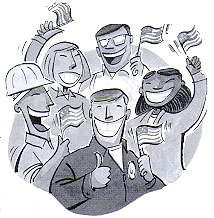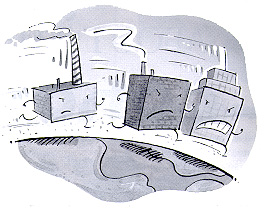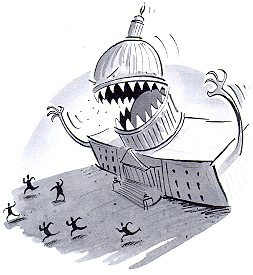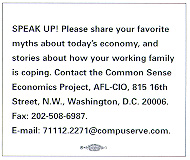| At the AFL-CIO Convention in Pittsburgh in September 1997,
the delegates, including BMWE members led by President Mac A. Fleming, adopted a number of
resolutions to help to rebuild the power of the labor movement. One of those resolutions
resolved that the AFL-CIO would develop programs to help unions gain a voice for their
members in the changing global economy. One of the programs that has been and continues to
be developed is the Common Sense Economics education program.
The goals of the Common Sense Economics program are to help workers understand more
clearly their economic interests in today's rapidly changing global economy, the real
causes of their problems at work and the importance of building stronger unions to address
those problems.
The information that appears on these pages comes from that AFL-CIO resolution and the
economics program. First is a little background on how the labor movement got to where it
is today followed by the top 10 myths about the economy. For more rail labor specific
background, see the President's Perspectives for 1997, particularly in the May issue of
the Journal.
Traditionally, the American labor movement has dealt with employers primarily at a
collective bargaining level. Unions organized workers, negotiated contracts and serviced
the contracts. Whatever took place above the collective bargaining level--company
ownership and governance, competitive strategy and business plans--was the employers'
business. Likewise, whatever took place below the level of collective
bargaining--factory or office organization, selection and introduction of new
technology--also was the employers' business. Employers ran the business and organized the
work; unions organized the workers.
For 25 years after World War II , collective bargaining worked, and worked well. Our
country enjoyed the most rapid and sustained rise in living standards in our history,
doubling the living standards of American families. The American middle class was built in
what now are called the "golden years" of rapid economic growth. Solid
productivity growth, matched step-for-step by real wage growth, assured that America's
prosperity was shared broadly. Some groups lived better than others, of course, but every
level of American society saw its living standards improve.
Things changed in the mid-1970s and have been different ever since. Economic growth
slowed to about half its previous pace. Productivity growth continued, although at a
slower rate, and the link between productivity and wages was broken as average real wages
began to fall. Since 1979, productivity has grown by nearly 30 percent, while real wages
have fallen by more than 10 percent. As a result, although the American economy is now
larger than it ever has been, family income is growing only for the top 20 percent of the
population. Family income for the bottom 80 percent of Americans is stagnant or falling,
although we are more productive and more Americans are at work than ever before.
The American Dream promised that if we worked hard and played by the rules we would get
ahead--year by year, generation after generation. The American dream has faded for the
vast majority of American workers, however, because wages have fallen. In the "golden
years," we all grew together, today we are growing apart economically, socially and
politically.
The slowdown of economic growth in the 1970s and increasing globalization since the
1980s have goaded employers into "low-road" competitive strategies in which they
seek to meet increasing competition by attacking the wages and living standards of
workers. Jobs have been lost, wages and benefits cut.
Corporate profits, which fell in the late 1960s, surged in the 1980s and 1990s. The pay
of corporate chief executive officers, which as late as 1979 equaled 40 times that of
frontline workers, has ballooned to more than 200 times the pay of today's workers. For
some Americans, these have been the best of times; for most American workers and their
families, these have been some of the most difficult times in memory.
The labor movement fought back valiantly to defend the wages and living conditions of
our members. But as power shifts steadily toward employers and away from unions, the fight
has become increasingly difficult. In 1955, at the height of our power, we represented one
out of every three American workers, but today we represent fewer than one out of every
eight.
American workers have become increasingly insecure as companies in the private sector
are bought only to be "restructured" for speculative gain, often with the
pension monies of workers that should be devoted to underpinning the retirement security
of American workers and their families. Deregulation of the airline, transportation and
communications industries and privatization in the public sector matched the private
sector's restructuring in destroying jobs and weakening unions.
Bargaining has become increasingly difficult as employers have demanded give-backs in
the name of increasing their competitiveness in the new global economy. Long-standing
bargaining patterns have unraveled as employers sought to shift the center of bargaining
away from the national industry level to the company and even the enterprise level.
New challenges have emerged in the workplace, as work has intensified and management
has advanced wave after wave of initiatives for workplace reform--each demanding
increasing flexibility in the name of enhanced competitiveness and each promising a new
high-performance workplace.
Competitiveness is important for increasing job security and improving job
satisfaction. But competitiveness should pursue the "high road" to increased
product quality and enhanced customer service in ways that provide real job security,
genuinely engage the knowledge and creativity of workers and strengthen rather than
undermine unions.
Increasingly, unions have challenged management's authority at all levels, from the
shop floor, to the bargaining table, to the board room and to Wall Street. Unions have
adopted aggressive and imaginative new strategies to help workers defend themselves from
the phony workplace reform programs initiated by management and to tap the expertise only
workers have to build their own programs for making work more secure, satisfying, safe and
remunerative.
Unions recognize that workers want much more day-to-day control of their lives to make
work as meaningful as possible. Workers also want to ensure that the goods and services
they produce are of the highest quality.
Unions have devised innovative bargaining strategies to defend themselves from
management's demands for concessions and to begin to reclaim for members some of the
benefits of improving productivity.
Unions have challenged the low-road competitive strategies of employers, the excessive
downsizing of companies, irresponsible corporate transactions and runaway executive
compensation. Unions also have sought to gain influence over pension funds and other
worker assets, to ensure that they serve the long-term interests of workers and their
unions.
The AFL-CIO also must play its part in rebuilding the power of the labor movement. The
Federation has resolved to develop programs to help unions build the capacity to give
workers a voice in a rapidly changing global economy, and to help unions deal more
effectively with employers at every level--from Wall Street and the corporate board room
to the bargaining table to the workplace; from the individual enterprise to the company
and industry; from the community to the state, nation and global economy. The labor
movement must challenge management's authority at all these levels to pave the high road
while blocking the low road. Only by helping to rebuild the power of the labor movement
can the promise of the American dream be restored.

The Top 10 Myths About The Economy
10. The economy is in great shape!
Only the rich are getting richer. They're the ones
benefitting from the booming stock market. They're the ones getting fat raises. CEOs saw
their pay jump 499 percent from 1980 to 1995. But we working families got a puny
9 percent raise in those 15 years--not enough even to keep pace with inflation.
Yes, unemployment's down--but so are the number of
decent-paying jobs, and jobs with benefits like health insurance and pensions. A lot of
folks have to take two or three of these new jobs just to make ends meet.
THE BOTTOM LINE:
The economy today is great for the lucky 10 percent--that
minority of Americans who have 70 percent of the country's wealth. The rest of us are
having a rough time.

9. We'd all be better off if government left the free market alone.
Without the government "interfering' in the free
market, we'd still have child labor, seven-day work weeks, monopolies to keep prices high
and industry barons keeping wages low.
If corporate America really wanted to get rid of
government regulations, it could start with "corporate welfare" that gives
billions of dollars in handouts to companies. Or say, "No, thank you," to
government services like law enforcement that protects its property and air traffic
control that keeps its executives safe in the air.
THE BOTTOM LINE:
Corporate America doesn't really want a market
free of government intervention. It wants a market that's free of those pesky government
efforts to protect workers and consumers.
8. Businesses aren't to blame for driving wages down. Global competition made
them do it.
"Global competition" has been a great excuse for
driving down wages and workers' rights. Ever notice that some of the companies using the
"global competition" excuse do all their business right here in the
U.S.? Mining companies, for example, and construction and retail companies--even
government.
Where global competition is real, we could have won!
Instead of using American ingenuity to expand their markets and make better products more
efficiently, when global competition heated up in the 1970s, U.S. businesses took the low
road. First they slashed wages and benefits here, then packed up the jobs and sent them to
the lowest-wage countries they could find.
THE BOTTOM LINE:
Corporate America has no business crying about global
competition. It's an excuse for multiplying its profits without sharing the wealth.
7. Free trade agreements create jobs.
The North American Free Trade Agreement has sent more than
420,000 U.S. jobs to Mexico and Canada since 1993. New U.S. jobs in the export sector
never materialized because the collapse of Mexico's peso made it even cheaper to move
factories and jobs south of the border.
NAFTA hasn't even helped our trading partners. With the
peso's collapse, Mexican workers are earning less.
THE BOTTOM LINE:
"Fair" or "managed" trade is a much
better approach. It protects U.S. workers and U.S. jobs. It also protects workers in other
countries from being exploited by rich companies offering pennies-an-hour wages and
inhumane working conditions.

6. Big government is what's wrong with America.
If your parents are getting by because of Social Security,
thank the government. If your water is safe to drink, your food is safe to eat and your
medicine is safe to take, tip your hat to the government.
And government today is smaller than it's been in
two decades. Government employees make up less of the nation's workforce than they did 20
years ago, and federal taxes are a smaller part of the nation's income.
But corporations and the wealthy have been shifting the
cost of government to working families. Corporations contributed 31 percent of the
nation's tax revenues in 1953, but just 9 percent in 1993. Families earning $560,000 or
more a year pay an average of $15,674 less in taxes than they did in 1977; families
earning $48,000 pay an average of $287 more.
THE BOTTOM LINE:
Corporate America likes the services that government
provides just fine. It just wants you and me to pay for them.
5. Higher wages cause higher prices and cost people jobs.
Raising wages actually can increase employment.
People with higher wages can buy more goods and services, meaning more workers are needed
to make the goods and provide the services.
Higher prices (which the politicians call
"inflation")? That's an old discredited argument corporate America uses to keep
wages low. Inflation still hasn't grown since the 1996 minimum wage increase.
THE BOTTOM LINE:
When workers get decent wages, it's good for them, good
for their families and good for the economy.
4. The federal budget deficit is destroying our future.
If you didn't pay cash for your house or your car, you're
a deficit-spender, too. The government is doing the same thing our families do--paying
over many years for big-ticket items, such as disaster relief, aircraft carriers, bridges,
roads and space ships. And the federal deficit has been cut in half since 1992.
THE BOTTOM LINE:
Deficit spending often is necessary--for our families and
for the government. Without borrowing, government wouldn't be able to smooth out economic
downturns, cope with natural disasters and economic emergencies or protect our national
security.

3. There's nothing wrong that a little retraining won't fix.
Job training is important--but it's not worth much without
jobs to train for. Instead of allowing U.S. jobs to be sent overseas, we've got
to get serious about job creation in this country.
THE BOTTOM LINE:
We spend far less on training and job creation than any
other industrial nation. America can do better.
2. Unions are bad for the economy.
Heavily unionized automakers, airlines, aerospace
companies, telecommunications giants and others are some of this country's largest and most
successful companies.
THE BOTTOM LINE:
Unions raise everybody's living standards in a
"virtuous cycle": When wages grow, consumers spend more; businesses invest more
in efficiency and productivity increases. This leads to higher wages and economic
growth--and the cycle continues.
1. There's nothing we can do about income inequality.
Working together, we can hold our bosses and our
government leaders accountable for the well-being of all of us--not just the monied
special interests. The labor movement did it before, and we can do it again.
THE BOTTOM LINE:
With a revitalized labor movement, working families can
build an equal voice in the economy.

SPEAK UP! Please share your favorite myths about
today's economy, and stories about how your working family is coping. Contact the Common
Sense Economics Project, AFL-CIO, 815 16th Street, N.W., Washington, D.C. 20006.
Fax: 202-508-6987
E-mail: 71112.2271@compuserve.com. |

